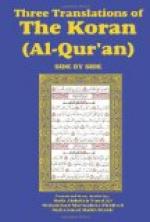3 Or, they invent not (concerning Him). Comp. Rev. iv. 8.
4 Lit. they precede him not in speech.
5 Lit. before thee, which might seem to imply that the grant of immortality had been made to Muhammad. I have therefore rendered, as in the text, to avoid the ambiguity. Comp. Suras [xcvii.] iii. 182; [lxxxi.] xxix. 57, and Weil’s Life of Mohammad, p. 350.
6 Comp. Matt. xvi. 28; Heb. ii. 9. Hist. Josephi Fabr. Lign. c. 22 at the end.
7 See the index under the word Man. The Rabbins teach that man was created with innate evil propensities. See Schr der’s Talm. Rabb.- Judenthum, p. 378. 8 That is, my teaching as to the future lot of the infidels, etc.
9 Muhammad appeals to the rapid progress of Islam as a proof of his divine mission.
10 Ar. furquan-a derived by Muhammad from the Jews, constantly used in the Talmud, and meaning as in Syr. and Æth. deliverance, liberation. Thus, Sura viii. 29, 42, and hence, illumination, revelation, generally. The usual interpretation here and in other passages is the distinction, i.e. between good and evil, lawful and unlawful. The title is applied to the Koran and Pentateuch alike.
11 This story is taken in part verbatim from Midr. Rabbah on Gen. par. 17. See also Schalscheleth Hakabala, 2; Maimon de Idol. ch. 1; and Yad Hachazakah, vii. 6, who makes Abraham-in his 40th year-renounce star-worship, break images, escape the wrath of the king by a miracle, and preach that there is one God of the whole universe.
12 Lit. sie neigten sich nach ihren Kopfen. They were turned down upon their heads. Ullm. and Sale in notes. But Ullm. in the text, verfielen sie wieder in ihren Aberglauben.
13 The Rabbins make Nimrod to have been the persecutor of Abraham. Comp. Targ. Jon. on Gen. xv. 7. Tr. Bava Bathra, fol. 91 a. Maimon. More Nevochim, iii. 29. Weil, Legenden, p. 74.
14 Or, let peace be upon Abraham. Comp. Targ. Jon. on Gen. xi. 28, from the mistranslation of which this legend took its rise, the word ur in Heb. meaning fire. See also Targ. Jon. on. Gen. xv. 7. The legend was adopted by some of the Eastern Christians; and commemorated in the Syrian Calendar on Jan. 29. (Hyde de Rel. V. Pers. 74). Comp. the Abyssinian Calendar on Jan. 25. (Ludolf. Hist. p. 409).
15 It has been observed that the blacksmith has ever been looked upon with awe by barbarians on the same principle that made Vulcan a deity. In Abyssinia all artisans are Budah, sorcerers, especially the blacksmith, and he is a social outcast, as among the Somal; Throughout the rest of El-Islam, the blacksmith is respected as treading in the path of David, the father of the craft. Burton. First Footsteps in E. Africa, p. 33. The numerous wars in which David was engaged, may have given rise to the myth of his being the inventor of mail.
16 See Sura xxxviii. 37, p. 127.




